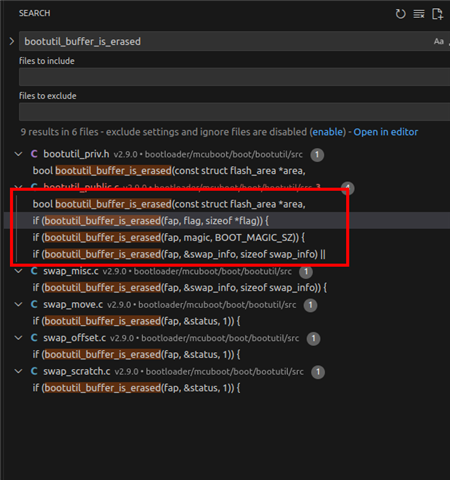Hi All.
Now I use soc:nrf5340, and ncs v2.9.0
I use QSPI to encrypt my external flash memory.
Adding some print functions in xxx_encrypt can ensure that it is encrypted only once and there are no changes in between
#ifdef CONFIG_MCUBOOT_ENC_EXT_FLASH
#define NONCE_CTX "test_string"
#include <hw_unique_key.h>
#include <nrfx_qspi.h>
static bool encrypt_completed = false;
int encrypt_external_flash(void)
{
nrf_qspi_encryption_t encrypt_param = {0};
uint8_t label[3] = {0}; // Label used for both key and nonce
int ret = 0;
if (encrypt_completed) {
printk("External flash encryption already done.\n");
return NRFX_SUCCESS;
}
if (!hw_unique_key_are_any_written())
hw_unique_key_write_random();
// Derive the key
uint8_t key_context[16] = {0};
memcpy(key_context, CONFIG_BOARD, strlen(CONFIG_BOARD));
ret = hw_unique_key_derive_key(HUK_KEYSLOT_MEXT,
key_context, sizeof(key_context),
label, sizeof(label),
(uint8_t *)encrypt_param.key, sizeof(encrypt_param.key));
if (ret)
{
printk("derive board key error: %d\n", ret);
return ret;
}
// Derive the nonce
uint8_t nonce_context[32] = {0};
memcpy(nonce_context, NONCE_CTX, strlen(NONCE_CTX));
ret = hw_unique_key_derive_key(HUK_KEYSLOT_MEXT,
nonce_context, sizeof(nonce_context),
label, sizeof(label),
(uint8_t *)encrypt_param.nonce, sizeof(encrypt_param.nonce));
if (ret)
{
printk("derive nonce ctx key error: %d\n", ret);
return ret;
}
// Perform encryption with DMA
ret = nrfx_qspi_dma_encrypt(&encrypt_param);
if (ret != NRFX_SUCCESS)
{
printk("nrfx_qspi_dma_encrypt error: %d\n", ret);
return ret;
}
// Perform encryption with XIP
ret = nrfx_qspi_xip_encrypt(&encrypt_param);
if (ret != NRFX_SUCCESS)
{
printk("nrfx_qspi_xip_encrypt error: %d\n", ret);
return ret;
}
MCUBOOT_WATCHDOG_FEED();
encrypt_completed = true;
printk("External flash encryption completed successfully.\n");
return NRFX_SUCCESS;
}
SYS_INIT(encrypt_external_flash, POST_KERNEL, 42);
#endif /*CONFIG_MCUBOOT_ENC_EXT_FLASH*/
I found that during the Bluetooth upgrade process, the values written by the "boot_write_magic" function and the values read back were not consistent.
This is using flash_area_write and flash_area_read. This function seems to be using the encryption engine of the underlying QSPI, right?
When I tried to write the hexadecimal numbers from 0x1 to 0x10, the values read out were also inconsistent.

Of course, disabling QSPI encryption will definitely not cause any problems.
However, according to my understanding, the erasure process does not utilize the QSPI encryption engine, as it involves physical-level erasure rather than data stream processing.
This ordinary read/write operation should automatically invoke the encryption and decryption functions of QSPI, right?
Looking forward to reply. Thanks


